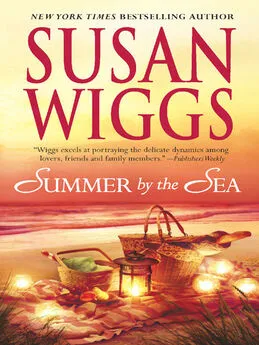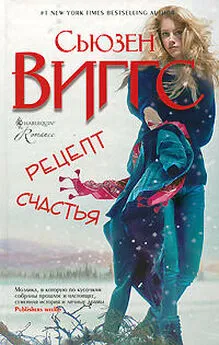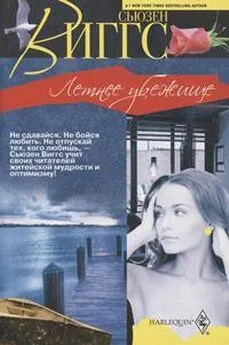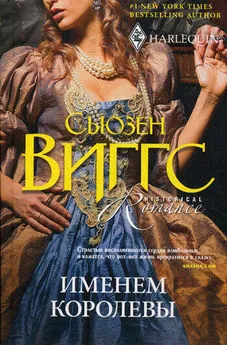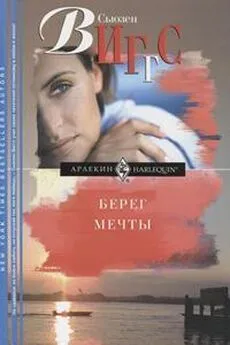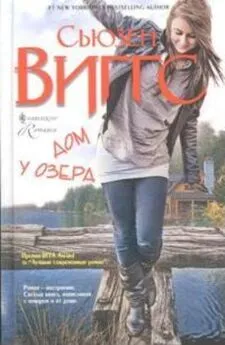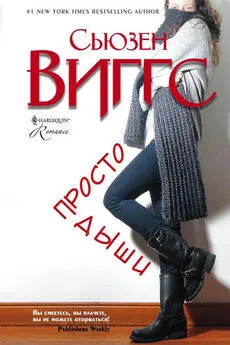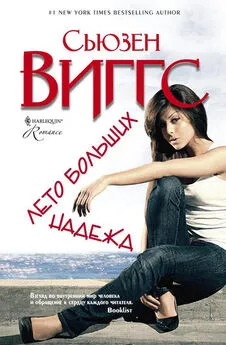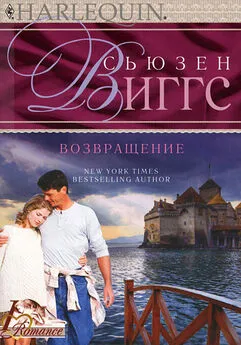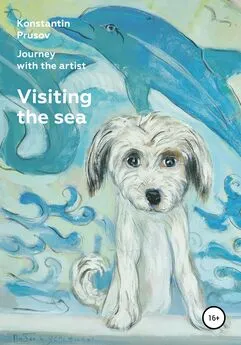Сьюзен Виггс - Summer By The Sea
- Название:Summer By The Sea
- Автор:
- Жанр:
- Издательство:неизвестно
- Год:неизвестен
- ISBN:нет данных
- Рейтинг:
- Избранное:Добавить в избранное
-
Отзывы:
-
Ваша оценка:
Сьюзен Виггс - Summer By The Sea краткое содержание
Summer By The Sea - читать онлайн бесплатно ознакомительный отрывок
Интервал:
Закладка:
Ricotta Cheese Sugar Cookies
1 cup softened butter
2 cups sugar
1 carton full-fat ricotta cheese
2 eggs
3 teaspoons vanilla (the kind from Mexico is best)
½ teaspoon salt
1 teaspoon baking soda
1 teaspoon grated lemon zest
4 cups flour
For the glaze:
1 cup powdered sugar
2-4 Tablespoons milk
2 drops almond extract (optional)
sprinkles
Preheat oven to 350° F. Mix cookie ingredients to form a sticky dough. Drop by teaspoonfuls on an ungreased cookie sheet. Bake 10 minutes or until the bottoms turn golden brown (the tops will stay white). Transfer to wire racks to cool. To make the glaze, stir milk a few drops at a time, along with the almond extract if desired, into the powdered sugar in a saucepan. Stir over low heat to create a glaze. Drizzle over cooled cookies and top with colored sprinkles. Makes 3-4 dozen cookies.
Seven
“Too bad about the rope swing,” Alex said, eyeing the rope that still hung from the tree branch.
“I took it from that shed behind the—what is that building, anyway? It’s too big to be a garage,” Rosa said, stopping to put on her flip-flops. The tall building was painted and trimmed to match the house. It had old-fashioned sliding wooden doors like a barn, an upper story at one end with a row of dormer windows facing the sea and a cupola with a wind vane on top.
“My mother parks her car there. She calls it the carriage house even though there’s no carriage in it.”
Sunlight glinted off the windows at the top of the house. “I knew it was way too fancy to be called a garage. Does somebody live there?”
“No, but somebody used to. In the olden days, a caretaker lived upstairs.”
“What did he take care of?”
“The horses. And carriages, I guess, but that was a long time ago. My grandfather used it as an observatory. He showed me how to spot the Copernicus Crater with a telescope.”
He sure did seem smart. Rosa nodded appreciatively, as though she knew what the Copernicus Crater was.
“My grandfather was teaching me about the stars, but he died when I was in first grade.”
Rosa didn’t quite know what to say about that, so she followed him across the property to the carriage house. The front doors were stuck, but they struggled together to push them along the rusted runners. Inside was a maze of spiderwebs, old tools and some sort of car under a fitted cover. “My mother’s car,” Alex said. “She calls it her beach car. It’s a Ford Galaxy. She hardly ever drives it, though.”
“My mother didn’t like driving, either.”
He shot her a quick look, and Rosa realized that now was her chance to tell him, because she’d said “didn’t” instead of “doesn’t.” But she decided not to say anything. Not yet. She might later, though. She’d already decided he was that kind of friend.
Before he could question her, she ran up the stairs. Sure enough, there was a whole house up there, flooded with dusty sunshine. Alex sneezed, and she turned to him. “Is this going to cause an as—” She couldn’t remember the word. “An attack?”
“Asthma attack. I don’t think so.” He stuck his hand into his pocket and she could see him feeling for the inhaler. Still, he seemed fine. So far, so good.
The furniture was stacked in a broken heap, like old bones on Halloween. The most interesting item was a spinning wheel. Rosa stepped on the pedal, and when the large wheel spun, she jumped back with a yell of fright.
Alex laughed at her, but not in a mean way.
“What are you going to do with all this stuff?” Rosa asked.
“I don’t know. My mother says she keeps meaning to clean it out, but she never gets around to it. I get to keep the telescope, though.” It was on a table in front of the biggest window. He opened the long black case to reveal the instrument broken down in parts.
“Can you see the man in the moon with that?” Rosa asked.
“There’s no such thing as the man in the moon.”
“I know. It’s just an expression.”
He shut the case, and a cloud of dust rose. When he breathed, he made a scary wheezing sound, and his face turned red.
“Hey, what’s wrong?” Rosa asked.
He waved his hand and headed for the stairs, gasping all the way like a cartoon character pretending to die. Rosa followed him in terror. When they got outside, she headed for the house to tell Mrs. Carmichael, but Alex grabbed her arm and pulled her back.
His touch felt desperate but not angry. “I’m okay,” he said, though his voice was only a whisper.
“Are you sure?”
He nodded. “Cross my heart and hope to—I’m sure.” His eyes looked brighter, somehow, than they had before. Magnified by the lenses of his glasses, they appeared huge.
“Was that an asthma attack?”
He grinned. “No way. That was just a little wheezing.”
“I’d hate to see an attack, then.”
“I’m all right. Let’s go to the beach.”
She hesitated, but only for a second. You just didn’t say no to a kid who spent half his life cooped up like Alex did. “Okay,” she said.
The Montgomery house overlooked a part of the shore almost no one visited, an area known as North Beach. It was a long, isolated curve of the coastline, a good hike from the nearest public beach. It was also a bird sanctuary, safe from development and a good distance from town. A path, overgrown by runners from wild roses and greenbrier, led through the sanctuary to the shore. The summer crowds had never discovered the marsh-rimmed beach, or if they had, it was too rocky to be popular.
“Too cold for swimming yet,” Rosa said, running down to the water’s edge. “But soon. Ever seen a tide pool?”
“In a book,” he said, following more slowly, breathing hard.
“I can take you to see some real ones.”
“All right.”
His breathing worried her. “Can you make it?”
“Sure, I’m okay.”
It was impossible to walk in a straight line on the beach; Rosa had never been able to do it. They darted back and forth, examining shells, overturning rocks to watch the tiny crabs run for cover, picking out a perfectly round, flat stone to skip.
Alex turned out to be a big talker. In fact, he was a funny, clever boy who took delight in everything she said and did, everything she showed him. And he knew things, too. He knew a dolphin swims at thirty-five miles per hour, and a baby gray whale drinks the equivalent of two thousand bottles of milk each day. So all that reading was good for something, after all.
He had a sister who was away at horseback riding camp. “Her name’s Madison. She’s fifteen. I’m not allowed to go to camp on account of my asthma.”
“It’s just as nice here,” Rosa declared, though she had no idea whether or not that was true.
“My family’s firm has offices in the city, and my father comes to the beach house only on weekends and holidays,” he said.
She didn’t really get what a firm was, but it seemed to keep his father plenty busy. “Which city?”
“New York City. And Providence, too. Where do you live?”
“In Winslow.”
“You’re lucky. I wish I could live here all year around.”
“I don’t know. It gets pretty cold in the winter. Summers are the best. Do you like swimming or hiking, going out in boats?”
“I don’t do things like that,” he said. “I’m not allowed.”
“That’s too bad.” What an odd boy, she thought. “Pop says when I’m twelve, I can go parasailing.”
“See what I mean? Lucky.”
“I guess. Maybe we could go down to the docks at Galilee and catch a ride on a fishing boat that’s heading out for the day. Mrs. Carmichael’s husband is a lobsterman. Did you know that?”
“No.”
She had a feeling he didn’t do much talking to the housekeeper. “My brothers’ names are Roberto and Salvatore. We call him Sal but never Sally.” She pointed out a firepit with the charred remains of a few logs. “My brothers used to build bonfires that would shoot sparks a mile high.” Just saying it made her miss Rob and Sal, who were so much older than her. Her parents used to call her their last blessing. After the boys, they weren’t really expecting to have a daughter, too, nine years later. Her parents had been older than the parents of her friends, but Rosa never cared about that. She was surrounded by love, she was the last blessing and she used to think she was the luckiest girl in the world.
“Maybe we could build a bonfire,” Alex said.
It was nice, the way he seemed to feel her turning sad, and spoke right up. “Maybe,” she said, and took him past the public beaches and parking lots to the rocky tip of Point Judith. “You have to be careful here,” she warned him. “The rocks are slippery. Sharp, too.”
He took a step and wobbled a little on his skinny white legs, then regained his balance. He looked very small, standing on the sharp-edged black rock with the waves exploding high into the sky.
Rosa put out her hand. “Hang on and watch where you step.”
He grabbed on, and his strong grip surprised her. He studied each move with deliberation, but they made steady progress. When a fount of white foam erupted between the rocks he was straddling, Alex jumped, but not in time to avoid getting his shorts soaked.
“Are you all right?” asked Rosa.
“Yes.” With his free hand, he straightened his glasses. “It’s steep.”
“Don’t worry.” She stepped down to the next rock. “I’ll catch you if you fall.”
“What if you fall?” he asked.
“I won’t,” she declared. “I never fall.” Step by unsteady step, she led him down to the placid clear pools that stayed filled at low tide. They studied hand-sized starfish and sea cucumbers, neon-colored algae and clusters of black mussels clinging to the rock. Alex knew what everything was from his reading, but he didn’t know how to make sunburst anemones squirt. Rosa showed him that. Splat, right on his eyeglasses.
Alex laughed aloud as he wiped his face, and the sound made her smile bigger than she’d smiled in weeks. Months, maybe. Crouched by the pool, she felt a slight change, like the wind shifting. They weren’t just two kids anymore. They were friends.
She sat back on her heels and tilted her face up to the clear blue sky. A trio of seagulls swooped over them, and Rosa looked away. Mamma used to have a lot of superstitions. Three seagulls flying together, directly overhead, are a warning of death soon to come.
Until Mamma, Rosa had never known a person who died. She used to think she knew what death was: a bird fallen from the nest. A possum at the side of the road, buzzing with flies. She had grandparents who had died, but since she’d never met them, that didn’t count. They were from a place in Italy called Calabria, which her parents called the Old Country.
One time, she asked Pop why he never went to Italy to see his parents while they were alive. You can’t go back, he’d said dismissively. It’s too much bother.
Rosa didn’t really care. She didn’t want to go to Italy. She liked it right here.
“What school do you go to?” asked Alex.
“St. Mary’s.” She wrinkled her nose. “I think classes are boring, and the cafeteria food makes me gag.” When they had to say the blessing right after Second Bell, she used to give extra thanks for her mother’s sack lunches—chicken salad with capers or provolone with olive loaf, sometimes a slice of cake and a bunch of grapes. There was always a funny little message on the napkin: “Smile!” Or “Only 12 more days to summer!”
Читать дальшеИнтервал:
Закладка:
